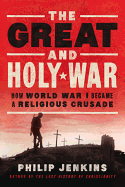
Philip Jenkins (Laying Down the Sword) has made a name for himself as a writer and academic who studies the interactions between history and religion. The Great and Holy War continues that tradition, offering an alternate account of the Great War through the lens of the religious history that surrounded it--and how the war ultimately reshaped the religious landscape of today. Jenkins goes beyond the many well-known stories of World War I--leadership's lack of experience with modern weaponry, the Christmas Truce of 1914, etc.--to investigate how religion played into the war.
Jenkins starts with a history of the massacres and battles of World War I, moving then to the role Christian nations had in shaping the landscape of the war, each leveraging divine language and mythology to call civilians and armies alike to their cause. He pulls in a variety of primary sources to explore the instances of martyrdom, visions and superstitions on the battlefield. From the horrors of battle that invoked images of the apocalypse to the ways in which the war opened windows of opportunity for new "prophets," Jenkins leaves no stone unturned in his effort to document this historical turning point from a different perspective. We've had more than 100 years to study the causes and consequences of World War I, but by synthesizing the social, political, military, cultural and religious history of the early 20th century, Jenkins manages to present an entirely new way of thinking about the war once thought to be "the war to end all wars." --Kerry McHugh, blogger at Entomology of a Bookworm

